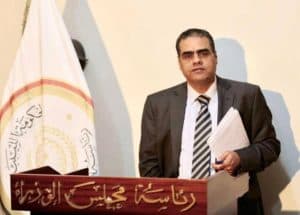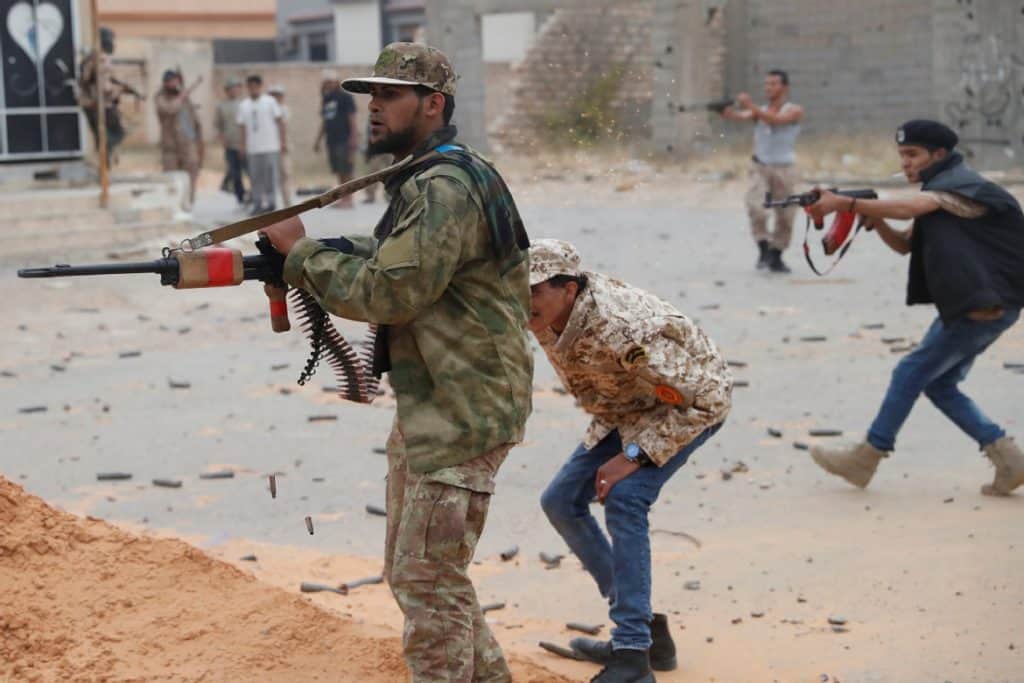After the overthrow and murder of Muammar Gaddafi in 2011, Libya is still experiencing a profound military-political crisis. In fact, the country is divided into two parts. In addition, supporters of the leader of the Jamahiriya continue to struggle for power, seeking to revive the ideals of the ousted ruler. Against this background, the trip to Tripoli, organized by Khalifa Haftar, creates additional obstacles on the way to ensure peace in Libya.

About this, “World Geostrategic Insights” talked with the former spokesman of the Provisional Government of Libya, Abdel Hakim Maatuk.
1. After the overthrow of the regime of Muammar Gaddafi in 2011, Libya actually lost its statehood, being divided into at least two parts. Thus, in the east of the country, a parliament headed by Aguil Salah al-Ubaidi is functioning, meanwhile in the west, including Tripoli, a government is formed headed by Fayez Sarraj. In addition, some eastern outskirts of Libya are under the control of the Libyan National Army Khalifa Haftar. The resulting duumvirate has as a direct consequence of the ongoing civil strife, the consequences of which negatively affect not only the internal situation of Libya, which was unable to ensure peace between the parties to the conflict, but also on the international field, where Tripoli attracts various kinds of military interventionists. How is it possible under such conditions to assert that irreversible reactions will not occur in Libya in the near future, leading to the complete loss of the status of a single state? What, in this case, should the parties to the conflict and the international community undertake in order to ensure stability in the territory of Libya? Do the parties to the conflict agree to sit down at the common negotiating table to work out a joint plan for resolving the Libyan crisis? If not, then for what reason: diametrically opposed positions of the parties, pressure from external forces not interested in ending civil strife and military intervention in Libya, or something else?
– In my opinion, the United Nations and the Security Council are the main reason for the split that is now happening in Libya. The direct military intervention of the international coalition was aimed at dividing the Libyan people into two sectors. Thus, in our country, an attempt was made to implement a military scenario similar to what was organized in Tunisia and Egypt, namely, to incite the various groups of forces against each other, so that they would be exterminated during the internecine struggle. To implement this scenario, the international coalition formed the so-called “National Front for the Salvation of Libya”, represented mainly by representatives of the Libyan opposition. This organization was engaged in the prosecution of many supporters of the overthrown regime of Muammar Gaddafi, unfoundedly accusing them of collaborating with British and American intelligence.
At the same time, participants in the National Fund for the Salvation of Libya were people who either have US citizenship or receive American funding. In addition, the fund included Islamists, among whom the Muslim Brotherhood and Al Qaeda played a significant role, led by its emir Abdul Hakim Balahaj. This emir used primarily militants who came from Afghanistan, or the so-called Arab Afghans, who fought with the Russian troops in the mid-1970s.
This was one of the most striking manifestations of the Strasbourg Plan called the Open Door Policy, which was implemented by Madeleine Albright to change the ruling regimes in the Middle East and was in line with the project of support for political Islam by the administration of Barack Obama. Despite the fact that the Libyan national elite was inconsistent from the very beginning of this conspiracy, its voice was not heard … due to the fact that the media I was engaged in (Al-Jazeera) was engaged in the public opinion industry and discrediting the regime of Muammar Gaddafi. NATO used the excuse associated with a false decision to protect civilians in Libya. This is the wealth of the Libyan state.
This influenced the fact that French President Nicolas Sarkozy launched an attack on the Libyan government forces in Benghazi, allegedly to fight extremist groups, as a kind of winding down of the support page Nicolas Sarkozy received in his election campaign from Libya, and the opportunity to get gas privilege , which led to the assassination of the Libyan leader Muammar Gaddafi. Meanwhile, the Libyan people continue to suffer even after the intervention of the international coalition. Many external players are still trying to influence Libyan affairs, thereby prolonging the crisis and closing their eyes to what political Islam and its armed weapons have been doing against the Libyan people for 8 years. This is the most important reason for the continuation of this crisis.
2.The overthrow and murder of Muammar Gaddafi happened solely in the interests of the people of Libya or in spite of them? It is worth noting that after the assassination of the leader of the Jamahiriya, his sons repeatedly declared their political ambitions and even tried to organize a coup in Libya. How likely is it that the image of Muammar Gaddafi could become the banner of popular resistance in Libya, as a result of which the country will be shaken by new social unrest of anti-state orientation?
– In Libya, there is still a large group of Libyans loyal to Muammar Gaddafi for many reasons. The most important of which were the murders, detentions and torture suffered by the supporters of the overthrown regime, which led to the formation of some nostalgia for a safe past that had the logical limits of a decent life. But his supporters went underground and did not have a clear project. No one takes their case. Like the family of leader Muammar Gaddafi, they are political corpses in Libya, and many of them count on the active role of Moscow.
They believe that if Russia will act more effectively in the Libyan crisis, the problems in Libya will be resolved faster. They can negotiate with the son of the ousted leader of the Jamahiriya (Saif al-Islam Muammar Gaddafi). The son of the murdered head of Libya is trying to take part in the political life of the country, and, perhaps, may have support from the Russian Kremlin through local groups of forces interested in stability in Libya.
As for the attempt to pressure him or physically kill him, this is a made-up story that blocks supporters of the late leader Muammar Gaddafi. In fact, no one will touch the leader’s son, because his opponents fear the wrath of the Libyan society. The image of Muammar Gaddafi is still in the hearts of many Libyans and is a source of inspiration for them.
3.In one of his interviews, the Commander of the Libyan National Army, Khalifa Haftar, said that if Tripoli was taken, he would ensure the creation of a committee that would develop the new Libyan constitution, as well as unite state institutions and disarm all armed groups. Does such a statement by the Libyan field marshal supporters among the population of Libya? How grounded is Khalif Haftar’s assertion about the need to adopt a new Libyan constitution? Which provisions of the current Constitution of Libya do not satisfy the Caliph Haftar?
– I was one of the first to join Khalifa Haftar. I paid a high price for this when I was jailed for my political views on false charges of murder. Subsequently, I was forced to live in Beirut. Currently, Khalifa Haftar considers himself a national hero, like Charles de Gaulle. He wants to clear Libya from various groups of takfiris. And for this he has done a great job, which finds support in the east and south of the country. I believe that sooner or later he will be able to unite the military forces, activate them and, possibly, form a crisis government to solve the existing problem in Libya.
As for the previous constitution, it is written with spears of winners (Islamists). It is right to demand the drafting of a new constitution that satisfies the desires and aspirations of all Libyans. As for his desire for the presidency, he will not depend on the Libyan street. But, in my opinion, that his state of health and age do not help him. In addition, he continues to say that he is waging a holy war against terrorism in order to purify Libya. Politically it is quite possible. However, this requires the support of the international community and its interest in bringing Libya back to normal in the Arab and regional environment.







